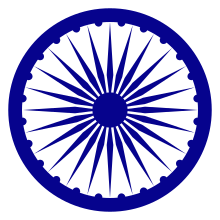Samay

In Sanskrit, samay (समय) is the "appointed or proper time, [the] right moment for doing anything."[1] In general parlance, samay is a unit of time. The samay chakra is the great chariot wheel of time which turns relentlessly forward.
Meaning[]
In current usage, samay means "time" in Indian languages such as Bengali, Hindi, Marathi, Gujurati.
In Jainism[]
Meaning[]
Samay represents the most infinitesimal part of time that cannot be divided further. The blink of an eye, or about a quarter of a second, has innumerable samay in it. For all practical purposes a second happens to be the finest measurement of time. Jainism however, recognizes a very small measurement of time known as samay, which is an infinitely small part of a second.
Measurements[]
The following are measures of time as adopted by Jainism:
- indivisible time = 1 samay
- innumerable samay = 1 avalik
- 16,777,216 avalik = 1 muhurt
- 30 muhurtas = 1 day and night
- 15 days and nights = 1 paksha (fortnight)
- 2 pakshas = 1 month
- 12 months = 1 year
- innumerable years = 1 palyopam
- 10 million million palyopams = 1 sāgaropam
- 10 million million sāgaropams = l utsarpiṇī or 1 avasarpiṇī
- 1 utsarpiṇī + avasarpiṇī = 1 kālchakra (one time cycle)
Example[]
When an Arihant reaches the stage of moksha (liberation), the soul travels to the Siddhashila (highest realm in universe) in one samay.
In Hinduism[]
Samay was the basic unit of time in ancient Hindu mythology. Currently, it is used synonymously with time.
Samay in music[]
Samay is a term used in Indian classical music to loosely categorize ragas into times of day. Each raga has a specific period of the day (prahar) when it is performed.
In Gandharva-Veda the day is divided into three-hour-long intervals: 4–7 a.m., 7–10 a.m., etc. The time concept in Gandharva-Veda is more strictly adhered to than it would be, for example, in Carnatic music.
See also[]
References[]
- ^ Monier-Williams. A Sanskrit-English Dictionary: Etymologically and Philologically Arranged with Special Reference to Cognate Indo-European Languages. Oxford University Press. sv. "samay."[full citation needed]
External links[]
- "Samay", SpokenSanskrit.org.
- Units of time
- Hindu cosmology